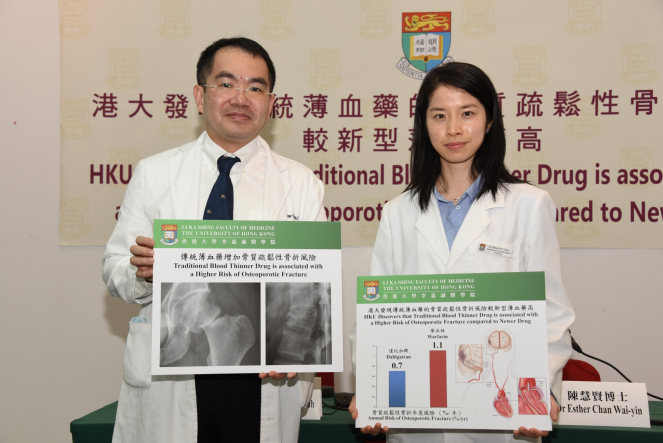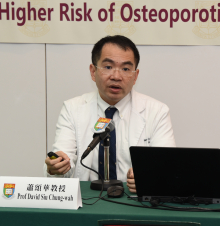Media
HKU Discovers that Traditional Blood Thinner Drug is associated with
a Higher Risk of Osteoporotic Fracture compared to Newer Drug
11 Apr 2017
A study conducted by Li Ka Shing Faculty of Medicine of The University of Hong Kong (HKU) analysed 8,152 atrial fibrillation patients who had attended public hospitals in Hong Kong from 2010 to 2014. The study found for the first time that when comparing the traditional drug warfarin to the newer drug dabigatran, warfarin was significantly associated with higher risk of osteoporotic fracture, which may increase the morbidity and mortality among the elderly, compared to dabigatran. The research findings have just been published in a top international peer-reviewed medical journal, Journal of American Medical Association (JAMA).
Atrial fibrillation
Atrial fibrillation is the most common sustained heart rhythm disorder in clinical practice. Worldwide, the prevalence is 1-2% in adult population, and its incidence has increased 2 folds over the past 20 years. In Hong Kong, the prevalence of atrial fibrillation is estimated to be 1% and the disease affects 55,000 to 70,000 adult populations. With the aging population, the prevalence of atrial fibrillation is expected to rise. Atrial fibrillation confers a 5-fold increase in stroke, often resulting in mortality.
Drugs for atrial fibrillation
Warfarin is a vitamin K antagonist oral anticoagulant that can effectively reduce stroke in patients with atrial fibrillation by 64%. It works by interfering with vitamin K-dependent biochemical reactions related to blood clot formation. As these reactions also play a role in bone mineralisation, there is concern that warfarin use may be linked with osteoporotic fracture. Despite the concerns for fracture risk, warfarin had been an inevitable treatment choice for over 50 years as there were no other alternatives available.
Dabigatran is a first non-VKA oral anticoagulant shown to be as good as or even better than warfarin in stroke prevention among patients with atrial fibrillation. According to a recent animal study, the use of dabigatran is associated with a better bone safety profile compared to warfarin in rats, suggesting a potential for a lower risk of osteoporotic fractures over warfarin. However, the actual risk of osteoporotic fractures with dabigatran versus warfarin in human remains unclear.
Research method
This was an observational study that utilised the anonymised territory-wide clinical database of the Hong Kong Hospital Authority. Patients newly diagnosed with atrial fibrillation from 2010 through 2014 and prescribed dabigatran or warfarin in the Hospital Authority were matched by propensity score at 1:2 ratio and followed until July 31, 2016. Risk of osteoporotic fracture at hip and vertebrae was compared between dabigatran and warfarin users using Poisson regression. The corresponding incidence rate ratio (IRR) and absolute risk difference (ARD) with 95% confidence interval (CI) were calculated.
Research findings
Using propensity score matching for 51,496 patients with atrial fibrillation, 8,152 patients were newly prescribed either dabigatran or warfarin, were entered into the final analysis (50% female; mean age 74 years [standard deviation 11 years]). After a mean follow-up of 500 days, 104 patients developed osteoporotic fracture (1.3%). There were 32 osteoporotic fractures in patients on dabigatran (1.0%) and 72 in patients on warfarin (1.5%). The annualised risk of osteoporotic fracture in patients on dabigatran and warfarin were 0.7% per year and 1.1% per year (36% reduction). Besides, amongst patients with history of falls and/or fracture, the risk of osteoporotic fracture in patients on dabigatran was 1.6 per year, which was substantially lower than those on warfarin, 3.6 per year (55% reduction).
Significance of the study
This study was conducted to compare the risk of osteoporotic fractures in patients with atrial fibrillation treated with dabigatran and warfarin. To the knowledge of the research team, this is the first population-based study that determined the risk of osteoporotic fracture with dabigatran versus warfarin in patients with atrial fibrillation.
Osteoporotic fracture is a key clinical concern amongst patients with atrial fibrillation, as both conditions are more common in elderly than in the younger generation. More importantly, after a hip fracture, 1/3 of elderly patients died within the first year, and many remains dependent. The study conducted by HKU has demonstrated that patients with on dabigatran have a lower risk of osteoporotic fracture, which is consistent with our findings of its survival benefits in our Chinese patients with atrial fibrillation. Patients who are in need of oral anticoagulation for stroke prevention would therefore benefit from a reduction in osteoporotic fracture risk by choosing a suitable oral anticoagulant.
About the research team
This research work was conducted by a multidisciplinary team from both local and abroad: Corresponding author: Professor Ian Wong Chi-kei, Professor of Pharmacy Practice, Head of the Research Department of Practice and Policy, UCL School of Pharmacy, London, UK, Professor of Department of Pharmacology and Pharmacy, and Co-Director of Centre for Safe Medication Practice and Research, Li Ka Shing Faculty of Medicine, HKU. Other researchers include Ms Wallis Lau Cheuk-yin, PhD candidate of Department of Pharmacology and Pharmacy and Centre for Safe Medication Practice and Research; Dr Esther Chan Wai-yin, Assistant Professor of Department of Pharmacology and Pharmacy and Research Lead of Centre for Safe Medication Practice and Research; Dr Cheung Ching-lung, Assistant Professor of Department of Pharmacology and Pharmacy; Ms Sing Chor-wing, PhD candidate of Department of Pharmacology and Pharmacy; Mr Kenneth Man Keng-cheung, Research Assistant II of Department of Pediatrics and Adolescent Medicine; Professor Siu Chung-wah, Professor of Department of Medicine; Dr Joanne Lam King-yun, Honorary Clinical Assistant Professor of Department of Medicine, Li Ka Shing Faculty of Medicine, HKU; Professor Gregory YH Lip, Professor of Institute of Cardiovascular Sciences, University of Birmingham, UK; and Dr Alan Lee Chun-hong, Specialist in Endocrinology, Diabetes & Metabolism, Queen Mary Hospital, Hong Kong.
Please visit the website at http://www.med.hku.hk/news/ for press photos.
Professor David Siu Chung-wah, Clinical Professor of Department of Medicine, Li Ka Shing Faculty of Medicine, HKU, points out that when comparing the traditional drug warfarin to the newer drug dabigatran, warfarin was significantly associated with higher risk of osteoporotic fracture.



